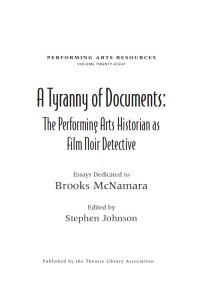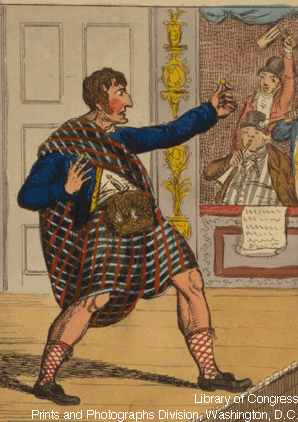 Performing Arts Resources, Volume 28, draws together essays by forty historians researching in theatre, film, dance, music, and popular and cultural performance, who were given this direction: to focus on a personal experience with a “tyrannical” document from the archive, a document that would not allow for an otherwise apparent conclusion, that flew in the face of the evidence, or that carried embedded in it some aspect of an event that was incomprehensible, no matter how much additional research was brought to bear on it.
Performing Arts Resources, Volume 28, draws together essays by forty historians researching in theatre, film, dance, music, and popular and cultural performance, who were given this direction: to focus on a personal experience with a “tyrannical” document from the archive, a document that would not allow for an otherwise apparent conclusion, that flew in the face of the evidence, or that carried embedded in it some aspect of an event that was incomprehensible, no matter how much additional research was brought to bear on it.
They were asked to reflect on the difficult balance sought among and between the historian’s respect for documentary evidence, the need to generate significance from it, and the natural-but-dangerous tendency to smooth out the rough edges of evidence.
We invite you to read the Introduction to the volume, as well as the Table of Contents. More about the volume can be found at http://www.tla-online.org/publications/par.html
INTRODUCTION
By Stephen Johnson
TABLE OF CONTENTS
When I wrote History Takes Time, I was preparing to go up for tenure. I was also advising a number of graduate students who felt they simply did not have time to do their work. I was distraught, as I felt and still do that we are conditioned more and more aggressively to be almost surgically strategic in doing our research. My own experience in largely unorganized archives in Mexico had taught me that some of the most important discoveries in doing historiographical research come from what you do not know is present before you begin that work, from looking at what else is in the file, from what articles and ads surround the newspaper article you had to read to do your work. [Read More]
About 5 years ago, I started a position as a joint appointment in departments of Theatre and Media Study. My formal training in media was as a more or less traditional film scholar. By contrast, most of my new media colleagues were engaged in more digital-focused projects: virtual reality; robotics; and social media. In conversations with them, I became increasingly aware of and connected to a community that was more than a little technophilic, if not outright utopian. [Read More]
I’ve been called a “historian in theatre-people clothing” — colleagues often comment on how much non-theatre history I include in my research. Given that both my parents are historians and that one of my dissertation advisors was a historian, this may not be surprising. However, it continues to resurface as a question: How much “history” do you need to know to do theatre history? For me, that question draws an artificial distinction among fields. John L. Brooke, currently a professor of history at OSU and one of my dissertation advisors back in the 1990s, once told me to “look for the names” in crafting any kind of history. That advice has continued to resonate for me over the years. It led me to my first book as I pondered why the founders of the 1794 Boston Theatre also kept showing up in legal cases involving something called the “Boston Tontine Association”. It turned out that the theatre’s founders amassed substantial amounts of money in their tontine scheme — part of which they poured into flouting state law and building Boston’s first professional playhouse.
Looking for the names automatically takes me across disciplinary boundaries. If my theatre founder turns up in a land scheme or a bank deal, I need to understand how he got there. In writing my chapter for Theatre Historiography: Critical Interventions I followed an even more elusive name — that of “Mr. Solomon” — a Jewish performer who appears in the historical record with no established point of origin and, so far, no first name. Mr. Solomon has become something of an obsession for me. On the one hand, he is supremely unimportant. He was never a star performer and appears only sporadically in the histories of the early national theatre. On the other hand, as one of the first Jewish American theatre performers in the new nation, he is incredibly important. Questions abound. Was he known to be Jewish at the time? Was he practicing his faith? What did he think about the negative Jewish stereotypes of the period? Did other Jewish Americans embrace him because of his faith, or did they reject him because of his profession? My compulsion to follow this one offered a wonderful opportunity for me to interrogate my own research process and to think seriously about whether there can ever be too much “history” in my theatre history.
 Performing Arts Resources, Volume 28, draws together essays by forty historians researching in theatre, film, dance, music, and popular and cultural performance, who were given this direction: to focus on a personal experience with a “tyrannical” document from the archive, a document that would not allow for an otherwise apparent conclusion, that flew in the face of the evidence, or that carried embedded in it some aspect of an event that was incomprehensible, no matter how much additional research was brought to bear on it.
Performing Arts Resources, Volume 28, draws together essays by forty historians researching in theatre, film, dance, music, and popular and cultural performance, who were given this direction: to focus on a personal experience with a “tyrannical” document from the archive, a document that would not allow for an otherwise apparent conclusion, that flew in the face of the evidence, or that carried embedded in it some aspect of an event that was incomprehensible, no matter how much additional research was brought to bear on it.
